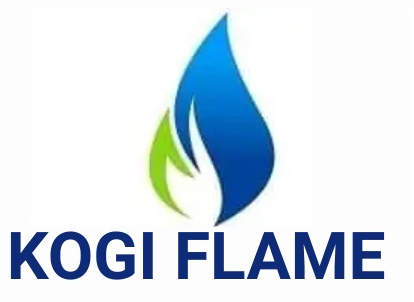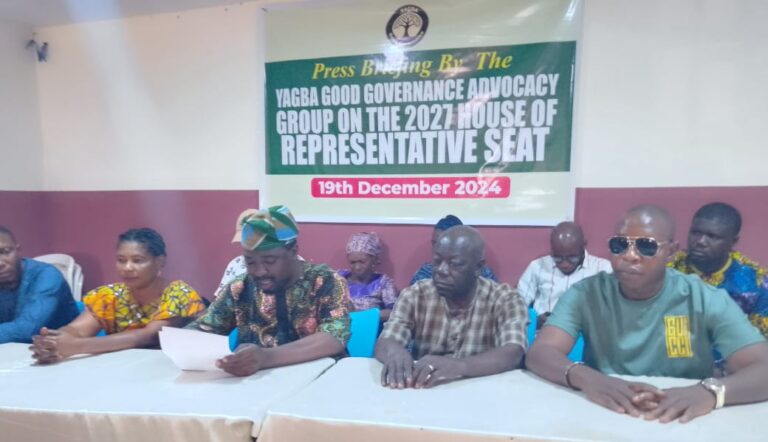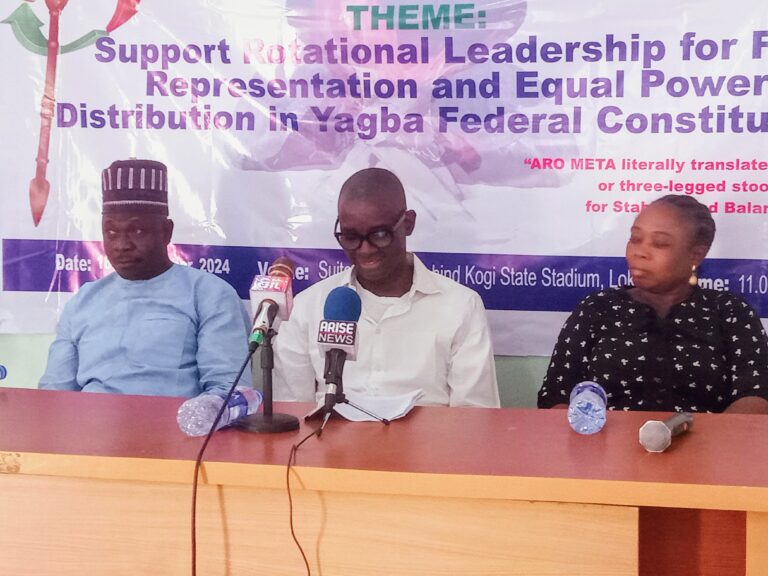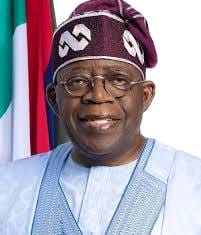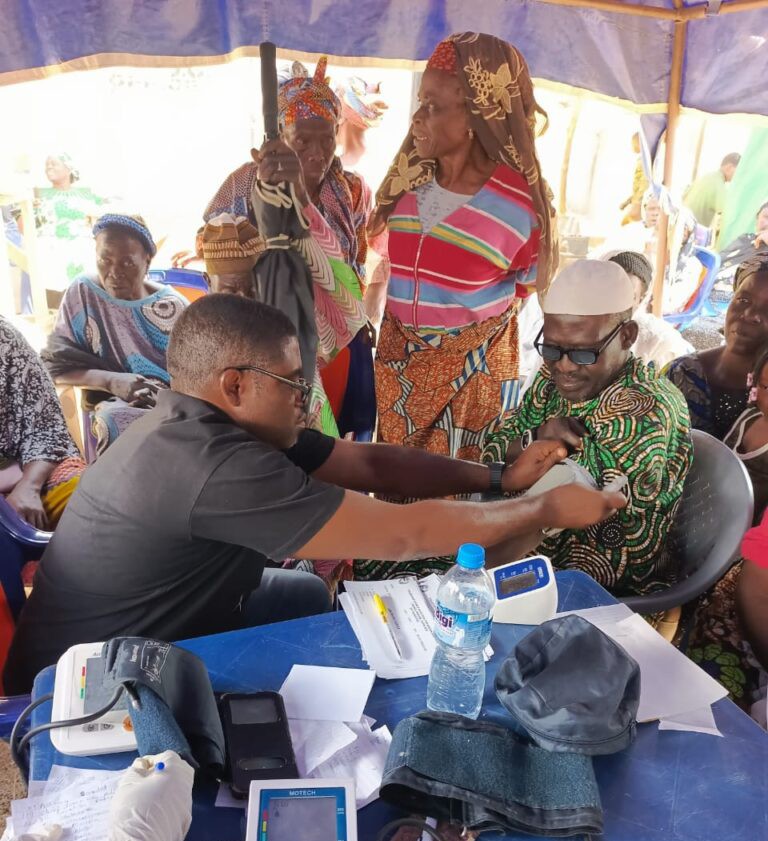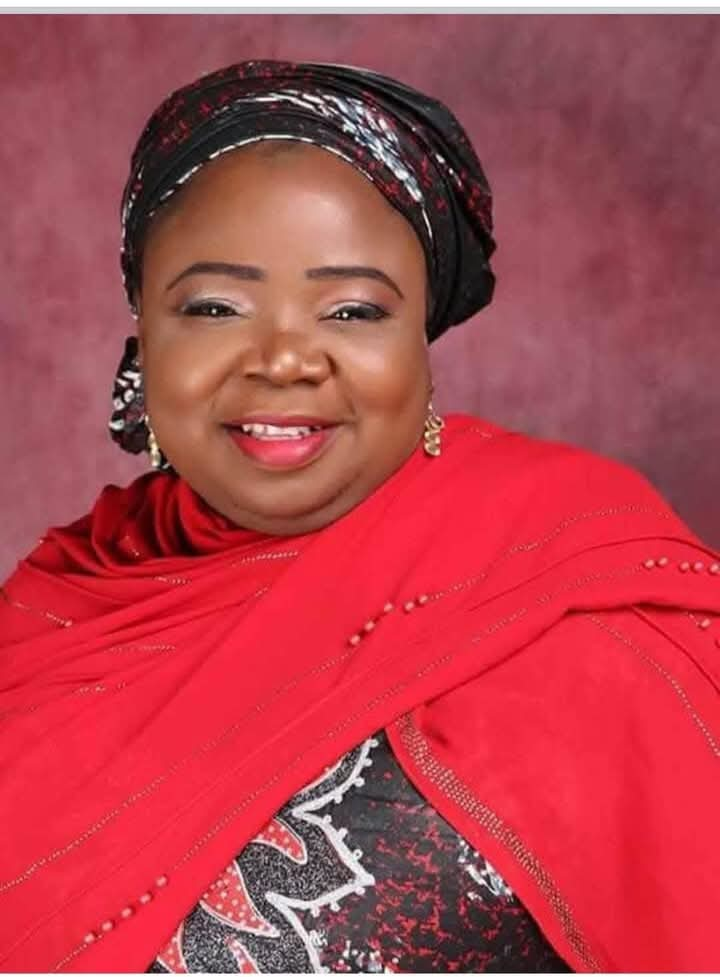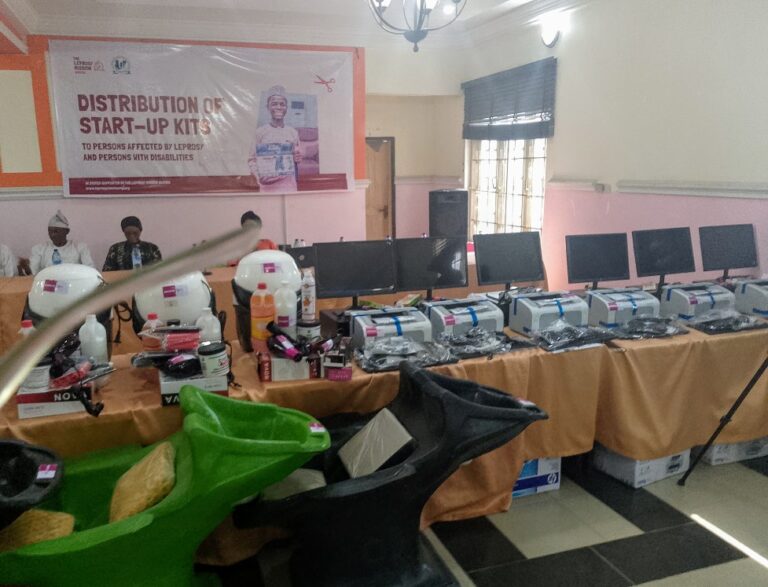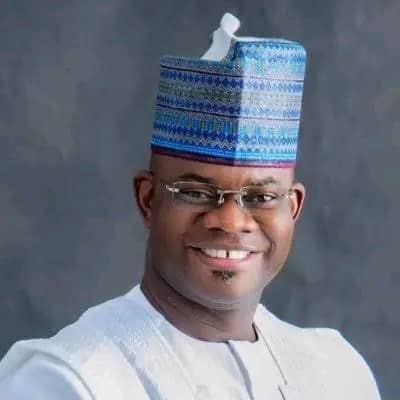Notice: Trying to get property 'post_excerpt' of non-object in /home/kogiflam/public_html/wp-content/themes/morenews/single.php on line 55
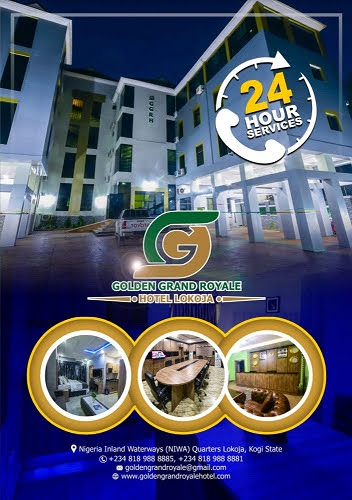
In response to the national call by the Federal Government of Nigeria (FGN) towards addressing the agitations from diverse interetes and ethnic nationalities for the need to amend some provisions of the Nigerian Constitution of the 1999 (as amended), the Ebira People’s Association (EPA), the umbrella socio- cultural organization of Ebira Tao ethnic nationality, constituted a seventeen-man Committee to articulate the positions of the people of Kogi Central Senatorial District on the thirteen thematic areas outlined by the National Assembly.
The high-powered committee which drew its membership from across the academic, professional, traditional, business, civil society and communal fora has Alh. (Barr.) Abubakar Abdulsalam, the EPA Secretary-General, as its chairman.
Other distinguished members of the committee include: His Excellency, Dr. Philips Salawu, FCA; Prof. Ozovehe Mike Ogrima, mni; Prof. Angela Okatahi; Prof. M. S. Audu; Dr. Habiba Suleiman; comrade (Alh.) Yusuf A. A. Hojapa,.mni; comrade M. B. Attah; Chief (Barr.) S. O. Momoh; Dr. Jerry Ohikere; Mrs. Maryam Abedo; Barr. Saka Ahmed; Alh. Kabir Yusuf; Comrade Mutari Lawal; comrade Aliyu Obiyo Ateiza; comrade Abdulazeez Ahmed and Baba Abdulrazak as Secretary.
The committee, having studied all the 13 thematic areas put forward by the National Assembly and consulted widely, proceeded to aggregating the pulses and germane concerns and agitations of cross sections of Ebira. Such expressions as received from the people guided the committee in responding to and sounding the voices of overwhelming majority of the Ebira people.
Issues as relate various areas of the proposed review of the constitution provisions were exhaustively piece apart and again brought together by the committee.
Synopses of some of the submissions by the people on the various thematic areas suffice below:
1. *Gender Equality and Child’s Right.* Nigeria suffers some developmental setbacks on account of her relegation of the woman gender to the background in the scheme of things.
Citing China and Malaysia as two nations that have empowered the woman gender to the point that the women are highly visible in management and public spaces have had accelerated growth and development. As a way forward, all existing repugnant customary laws and practices against the woman gender (child marriage, female genital mutilations etc) should be declared unconstitutional, null and void.
2. *The Federal Structure and Power Devolution*
The current political structure of the country doesn’t take adequate care of her certain peculiarities. To optimise the current presidential system of government, the system should be restructured to address issues that tend to threaten our bond of nationhood.
The country should operate a guided Presidential system of government that allows alternation of of the Nigeria presidency between the Northern and Southern parts of the country while simultaneously rotating the presidential power amongst the 6 Geo-political Zones of *NCZ, NEZ, NWZ, SEZ, SWZ and SSZ*.
To ensure the effective workability of this model, there should be two Vice Presidents: the VP-Political and the VP- Economy, with the VP Political sharing the same geographical zone with the President so that he/she succeeds the president in the event of any political accident such as the death of the president as witnessed in the case of the late Alh. Umaru Musa Yar’adua.
*Devolution of power*: Administrative governance in Nigeria has remained too centralized at the Federal level. Democracy is greatly enhanced with the downward transfer of power and resources to lower level authority which maybe more democratic and inclusive.
The FGN should shed-off power more fairly to the State and Local Government Council’s, relieving itself of too “much burden”. The current power-sharing should be adjusted to *45%, 30% and 20%* respectively for Federal, State and the LGA.
The Constitution should strip the FGN of its role in Agriculture and Rural Development, Education, Culture, Religion and Tourism. Other areas are public Works, Transportation, Mining and Power Generation.
3. *Local Government/Local Government Autonomy*
The stifled state of the LGAs is a major impediments to the flow of dividends of democracy to the masses of Nigeria. This view is held against the fact that the LGA is not just the closest, but one that directly overlooks the welfare of over 70% of Nigerians. Currently, the LGAs are not effective federating units as the states and federal government.
To ensure that governance reaches the people, a Full Local Government Autonomy must be provided for constitutionally.
Going forward, Ebira people are compelled to justifiably demand for the creation of additional eleven Local Government Areas in Kogi Central Senatorial District. The demanded LGAs include:
a. *Adavi Central; Adavi North and Adavi South LGAs from the present day Adavi LGA*
b. *Ihima; Okehi West and Okehi North LGAs from present day Okehi LGA.*
c. *Okene Municipal; Ageva; Okene South and Okene North LGAs from the present Okene LGA.*
d. *Eviya LGA from the present day Ajaokuta LGA.*
The creation of the aforementioned LGAs will bring about little or no extra cost of governance to the FGN. This is because they satisfied both population and resource thresholds, hence their self-sustaiinability.
5. *Public Revenue, Fiscal Federalism and Revenue Allocation*
No true development can be recorded without sustainable sources of revenue. The current public revenue system shackled by the nation’s self-inflicted monolitic -economy should be revamped through the diversification of the economy into solid minerals and agriculture. In this regard, the resuscitation and operationalization of the Ajaokuta Steel Company holds the ace promise, alongside necessary investments in Agriculture and manufacturing.
The current revenue sharing formula should be adjusted to *45%, 30% and 20% respectively for the Federal, State and LGA, while 5%* be set aside as contingent fund.
Mineral Derivation Funds (covering minerals and exportable agricultural products) should be deducted from earnings for concerned states and LGAs before distribution.
6. *Nigerian Police and the Nigerain Security Architecture*
The worsening state of security in Nigeria has remained a grave source of concern for over a decade now. The Police and her sister security operatives are overwhelmed by the situation. Obviously, the nation’s security architecture is in dire need of clinical surgery that should produce:
a. A centrally-structured Police Command that is reformed in the areas of its recruitment quality, training and retraining, equipment, remuneration and general motivations.;
b. A community – policing driven by enhanced local vigilante operatives and not the untested state police should be given a life immediately.
Very necessary for both citizens and national security is a system that ensures effective social welfare for all citizens, improved accountability in governance and a sound Judicial system as a way forward should be provided for constitutionally.
7. *Comprehensive Judicial Reform*
Given Judicial Autonomy as a concept that mostly relates to financial Autonomy of the judiciary, the Constitution should mandate the Account-General of the federation to pay Judicial allocation directly to the Judicial arm of each state. Federal courts such as Federal High Courts, and the appellate Courts should also receive their allocations directly from the consolidated revenue funds as first line charge of sort. With this in place, Courts will be immuned from inordinate interferences of the Executive in particular and the Legislature.
8. *Electoral Reform and the Strengthening of INEC Deliver Credible, Free and Fair Election*
The incidences of widespread irregularities in the nation’s electoral and electioneering processes which often translate in electoral violence, delay and inconclusive elections, vote buying, ballot box- snatching, loss of life and properties are a major challenge to the nation’s political journey.
The Constitution should enforce the digitalization of the electoral process including electronic voting, counting and automatic display of result.
All persons seeking elections whose criminal cases are pending or had been indicted by Judicial adminstrative panel or court should be disqualified from elections.
9. *Socio – Economic and Cultural Rights as Contained in the Constitution*
It’s regrettable that Socio-economic and Cultural Rights such as equal access to political power, economic power, social equity, educational and environmental rights can be re-echoed but are presently not justiciable in accordance with Section 6(6) (c) of the 1999 constitution.
Education should be made compulsory for every Nigerain 6 to 18 years, i.e primary through secondary education. The Constitution should mandate a period review of the nation’s education curriculum to meet and solve the nation’s medium and long term economic development plan.
Equally, the Constitution should provide for a stiff penalty for both the child and parent that fail to go school/take the child to school.
10. *Residency and Indigene Provisions*
Issues as bothering residency and Indigene rights have brought serious concern in the nation’s polity. While residential citizenship is ideal for inclusive spirit of nationhood, peculiarities imposed by primordial encumbrances such as group’s culture, traditions and other nativities remain an issue.
To this end, therefore, a resident should enjoy a full citizenship of a place having resided there for an upward of 15years if he/she contributes meaningfully to the socioeconomic development of the concerned host-community.
11. *Immunity*
Immunity is being misrepresented as as a shield for corrupt government officials (President & Govs.) to get away with their crimes. This is incorrect as democracies in other climes have fared very well with immunity in place.
The Constitution should retain immunity clause as its removal could cause daily distraction, chaos and crises for the President and Governors, as they are possibly going to be attending politically motivated court cases on almost daily basis.
The Immunity clause should be amended to be enjoyed by the leadership of the three arms of government- this will enhance governance and promote a mutually-inclusive independence of the component arms of government.
12. *The National Assembly*
The National Assembly as a pivot on which democracy revolves should provide the people with the greatest opportunity to be part of the processes that govern them.
However, the Senate is almost made a retirement home for Ex-governors, a development that hampers effective people’s representation at the upper chamber of the National Assembly.
In retaining the Bi- camera structure of the National Assembly, (the upper and lower Chambers) – for Equality of States (the Senate) and Equity of population – (the House of Representatives); the Assembly should be run on part-time basis. This will lower the cost of governance.
13. *State Creation*
The agitations for State creation are obviously driven by maladministration and non – inclusive governance by dominant groups who in most cases Lord it over less-privileged groups in their states. To douse the unnecessary tension being generated by these avoidable agitations for State creation, the constitution should mandate the state governorship seat to rotate among the three Senatorial Districts of the state.
The creation of more Local Government Council with full Autonomy is icing on the cake – governance is brought at the doorstep of greater number of Nigerians.
*Conclusion*
Ratifying and accepting document, Dr. Abdulrahaman Adeiza, the EPA President-General (PG), commended the committee for caring out a thorough job. The PG expressed great delight at the committee whose very distinguished personalities/members (great sons and daughters of Ebira) he (the PG) said have brought their great wealth of experience, passion and industry to bear on the Committee’s assignment.
Dr Adeiza further declared that, “EPA is eminently grateful to you all. This document will hopefully and invariably form a basis for Ebira future engagement with Federal, State and other institutions in Nigeria”.
In commmending the FGN and the National Assembly in particular for the proposed review exercise, Dr. Adeiza maintained that Ebira people are strong believers in the national concerns and agitations for certain amendments to the Constitution, as a means of responding to the dynamism of the time. He stressed further that it’s the conviction of the people that only these amendments that can help the people to find their place in the current dispensation in the country.
*Special Appeal to the National Assembly*
By way of an addendum, the committee seized the opportunity to specially appeal to the National Assembly on the following issues:
1. *The stalled efforts at converting the Federal College of Education (FCE), Okene, to a University of Education.*
The committee pointed out that the institution is one of the first generation FCEs in Nigeria and that it has contributed immensely to the country’s educational development through middle manpower training and development for the nation’s industrial advancement.
The committee reminded the National Assembly that the Bill for conversion exercise had passed first reading at the apex nation’s law making institution and that confering a specialized University status on the College which is the only institution of higher learning in Kogi Central Senatorial District will further the cause of education in Kogi state and Nigeria at large;
2. *The Resuscitation of Ajaokuta Steel Company*
The committee decried the neglected state of the Ajaokuta Steel Complex, expressing optimism that the company can take the country out of the wood economically, if resuscitated.
While commmending the renewed efforts of the Federal Government at reviving the company, the committee charged the National Assembly to rise up to the ocassion by way necessary legislation towards reinjecting life into the steel complex. It defies sound economic logic that a one-off $1.5 billion needed to complete the company could be depriving Nigeria of an annual $3 billion revenue that an optimally functional Ajaokuta Steel Complex guarantees, according FGN 2016, 2017 and 2018 reports.
Signed:
……Dr Adeiza..Musa Abdulrahman
PG, EPA….
